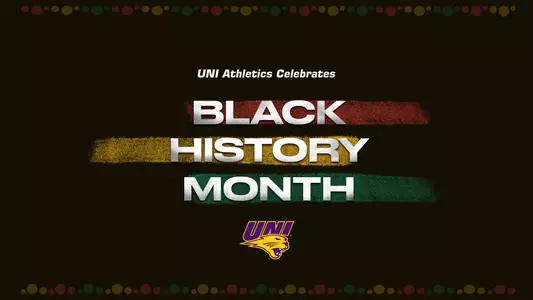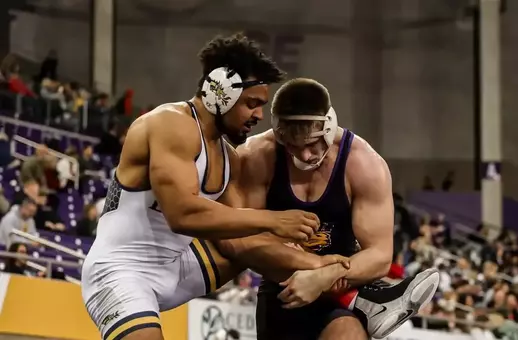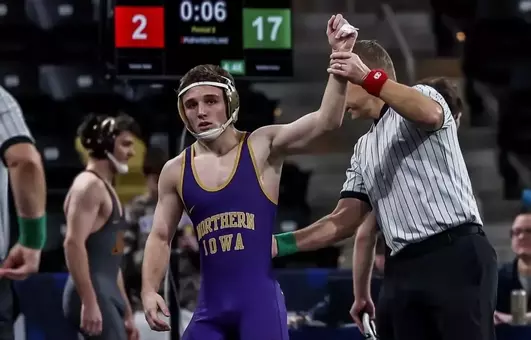University of Northern Iowa Athletics

Celebrating Black History Month 2024: Joe Hatchett
2/2/2024 10:30:00 AM | Wrestling
Cedar Rapids native became first African-American to earn All-American wrestling honors at UNI with over 100 career victories.
Panther wrestlers from the early 1970s recall Joe Hatchett's extraordinary physique as being one of his defining attributes in becoming one of the nation's top collegiate wrestlers. So much so that during one home dual, teammates, opposing athletes and fans would be astonished when they saw him weigh-in fresh off doing a set of pushups in the locker room.
That's who Joe Hatchett was as a competitor, and it's that work ethic that helped him become the first black wrestler in UNI history to earn All-American honors.
A Cedar Rapids, Iowa native, Hatchett was a dominant three-sport athlete at Washington High School, so impressive enough that he was inducted into its Athletic Hall of Fame for his accomplishments in all three sports. Hatchett ultimately chose to begin his collegiate career at North Iowa Area Community College (NIACC) in Mason City, where he immediately made an impact for the Trojans.
to begin his collegiate career at North Iowa Area Community College (NIACC) in Mason City, where he immediately made an impact for the Trojans.
Known in college for his strength and excellent headlock, Hatchett went undefeated during the 1970 season, topping Bob Backlund of Waldorf College to win his first national championship at 190 pounds, becoming NIACC's first-ever black All-American in any sport. A year later, he did it again, topping Al Sye for his second straight title while also earning Most Outstanding Wrestler honors for the meet.
While the bond with his teammates was strong as part of a united family, Hatchett did face some racial adversity in his time with the Trojans. Opposing fans were known to heckle the standout athlete, and on one occasion throw rotten eggs in his directions. This did not deter Hatchett however, finishing with an undefeated record of 36-0 in his two seasons in Mason City.
After two impressive years at NIACC, Hatchett made the jump to the then-Division II Northern Iowa program. The signing, which was heralded as a major pickup for the Panthers, provided a major boost for UNI in the upper weight classes. When asked about the signing of Hatchett in the spring of 1971, Panther head coach Chuck Patten called him "one of the best recruiting prizes ever!"
Hatchett again made an impressive impact on his team from the start, winning the 1972 North Central Conference crown in his first year in Cedar Falls. On the national stage, he would finish in second-place at the NCAA Championships in New York at 190 pounds to become the university's first black All-American in wrestling. It wouldn't be until 2000 when another Panther wrestler of color earned All-American recognition, when Tony Davis won the national title at 149 pounds.
Despite an impressive run representing the purple and gold, Hatchett's collegiate career came to a sudden end after the 1971-72 season when the NCAA ruled he was ineligible to compete in the following season. In its ruling, the NCAA determined that Hatchett had been charged three years of collegiate eligibility while at NIACC, despite only competing for a year and a half.
Hatchett finished his Panther career with a 30-4 record and 14-1 mark in dual meets. Bookending his collegiate career, Hatchett finished with a combined mark of 114-15-1.
After his time competing for UNI, Hatchett continued to stay in shape and began competing in bodybuilding competitions. Despite not having much knowledge of the bodybuilding circuit, he would find great success in his journey, and go on to be named "Mr. Iowa" during his career.
Hatchett's love and spirit for the Panthers lives on today in his daughter, Joellen, a 2016 UNI graduate, currently serves as an academic advisor at Loyola University in Chicago.
"My dad's accomplishment as an All-American especially at a time where the civil rights movement was still in the forefront of many people's minds in Iowa at a predominately white institution, was historic," Joellen said. "Many times he was the only Black athlete on his team. As someone who was usually the only student of color in my classes when I attended UNI, I would imagine this was the case when he was at UNI as well. There were definitely times he was treated differently or things were said to him, but he used that as motivation and worked out his frustrations on the mat. In celebration of Black History Month, it is important that we celebrate the historic moments of the past and also look forward to how we can create the environment to support Black students and other students of color moving into the future."













